This year’s March 8 U.N. International Women’s Day slogan “Invest in Women: Accelerate Progress” draws attention to the $360 billion annual deficit in gender-equality measures by 2030. According to the United Nations, there are five key areas requiring joint action:
- Investing in women, a human rights issue: Time is running out. Gender equality is the greatest human rights challenge, benefiting everyone.
- Ending poverty: Due to the COVID pandemic and conflicts, 75 million more people have fallen into severe poverty since 2020. Immediate action is crucial to prevent over 342 million women and girls living in poverty by 2030.
- Implementing gender-responsive financing: Conflicts and rising prices may lead 75% of countries to cut public spending by 2025, negatively impacting women and their essential services.
- Shifting to a green economy and care society: The current economic system disproportionately affects women. Advocates propose a shift to a green economy and care society to amplify women’s voices.
- Supporting feminist change-makers: Despite leading efforts, feminist organizations receive only 0.13% of official development assistance. [Source]
March 8 Women’s Day has revolutionary roots, and a long history in China as a socialist holiday commemorating working women. Observed by communists in China since at least the founding of the Chinese Communist Party in 1921, it became an official national holiday with the establishment of the People’s Republic of China in 1949. Like many other holidays, it has become more commercialized over the decades, with numerous online and brick-and-mortar retailers offering special Women’s Day (or “Girl’s Day,” “Goddess Day,” or “Queen’s Day”) sales, discounts, and promotions. In recent years, in tandem with the party-state’s neo-traditionalist, pro-natalist propaganda and suppression of feminist discourse, there has been an increase in both online and on-the-ground censorship of Women’s Day activities and commemorations.
(CDT has an extensive archive of past International Women’s Day content, including 2021’s student-led effort to reject the moniker “Girl’s Day”; 2022’s outpouring of banners and posters in response to the plight of a woman from Jiangsu province who was trafficked and kept shackled in a freezing shed; a 2022 essay about 25 things men can do for women on International Women’s Day; a 2022 bilingual subtitled video of the Beijing Queer Chorus singing “The Song of Women,” with lyrics about women’s rights, set to the tune of “Do You Hear the People Sing?”; 2023’s inspirational pop-up store and feminist Taobao shop; and a 2023 book about the women of “Salt Town.”)
This year saw the rapid replacement of sidewalk messages celebrating women in the city of Chongqing, Sichuan province; a useful feminist reading list from a progressive bookstore; and a compilation of Women’s Day messages from WeChat Moments to serve as a counterweight to what one writer called “misogynistic voices that would slander women or abolish their freedom.” The censored sidewalk messages from Chongqing were shared on X (formerly Twitter) by Teacher Li. CDT’s translation appears below the images:
“我想要自由,平等。这不是女权,这是人权。”
3月3日,重庆观音桥北城天街布置了大量粉色标语展示女性力量,拒绝女性污名化,以庆祝三八国际妇女节。 pic.twitter.com/iX3X2FIRIk— 李老师不是你老师 (@whyyoutouzhele) March 3, 2024
“I want freedom and equality. This isn’t ‘feminism,’ it’s human rights.” On March 3, 2024, a large number of pink slogans were displayed on Beichengtian Street near the Guanyinqiao pedestrian bridge in Chongqing. Expressing the power of women and rejecting the stigmatization of women, the slogans were in celebration of March 8 International Women’s Day.
3月4日,重庆观音桥北城天街所有标语被全部置换,新标语不再带有ID。
“我想要自由,平等,这是人权,不是女权。”这条已经被撤下。 https://t.co/y0TpV2Sidz pic.twitter.com/an9pSjIB31— 李老师不是你老师 (@whyyoutouzhele) March 4, 2024
By March 4, all of the [International Women’s Day] slogans on Beichengtian Street near the Guanyinqiao pedestrian bridge in Chongqing had been replaced, and the new slogans no longer include the authors’ nicknames. One of the slogans that was removed read: “I want freedom and equality. This isn’t ‘feminism,’ it’s human rights.”
“The Status of Women is a Barometer of a Civilized Society,” a March 7 WeChat post from Navia Books (先知书店, Xiānzhī Shūdiàn), offered a brief primer on the history of women’s rights and the feminist movement. It also included a recommended reading list of four great feminist works of literature: Simone de Beauvoir’s “The Second Sex,” Li Yinhe’s “Feminism,” Chizuko Ueno’s “Patriarchy and Capitalism,” and “The Birth of Feminism,” by Sarah Gwyneth Ross.
Lastly, WeChat user TING说心理 (TING shuō xīnlǐ, “TING talks about psychology”) shared a collection of International Women’s Day messages from her friends’ WeChat Moments, with the following message:
Wishing all women the freedom to flourish—
Despite some misogynistic voices that would slander women or abolish their freedom, today’s WeChat Moments are extraordinarily lively and utterly unstoppable.
I have selected some of the best images among them. On this holiday, I wish you all the freedom to flourish, and to embrace a vaster and more limitless future! [Chinese]
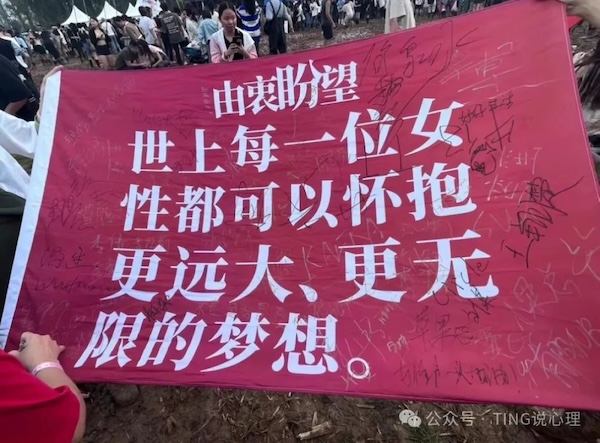
I sincerely hope that every woman in the world can aspire to vaster and more limitless dreams.
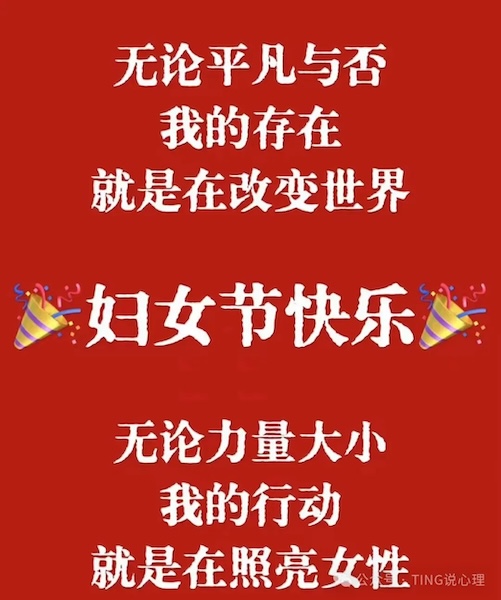
My existence, be it ordinary or extraordinary, is changing the world.
Happy Women’s Day!
My actions, be they great or small, are shining a spotlight on women.
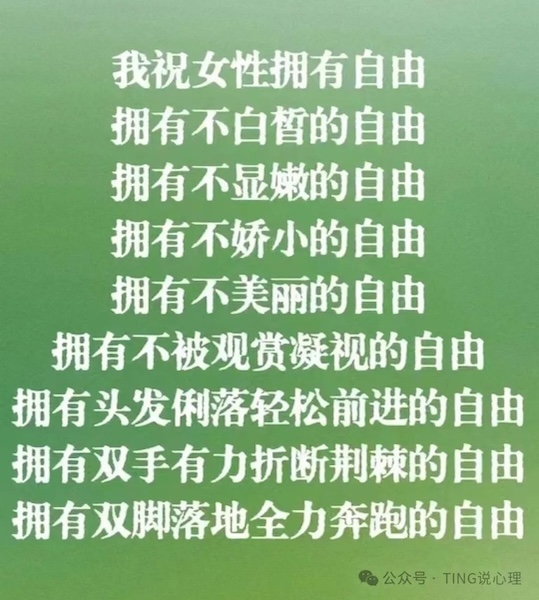
I wish women freedom—
the freedom of not having to be fair-skinned
the freedom of not having to look dainty
the freedom of not having to be petite
the freedom of not having to be beautiful
the freedom not to be stared at
the freedom to walk through the world with a neat, short hairstyle
the freedom to break thorns with a strong pair of hands
the freedom to run as fast as the wind with both feet on the ground
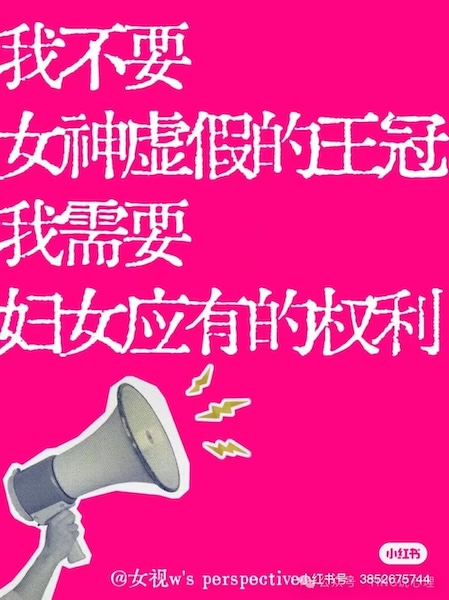
I don’t want the false crown of a goddess.
I want the rights that all women are due.
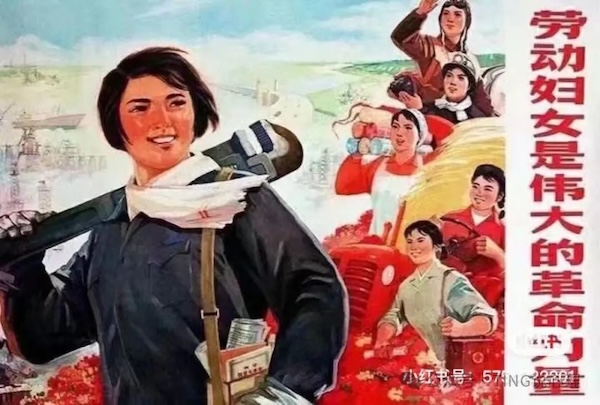
Working women are a mighty revolutionary force!
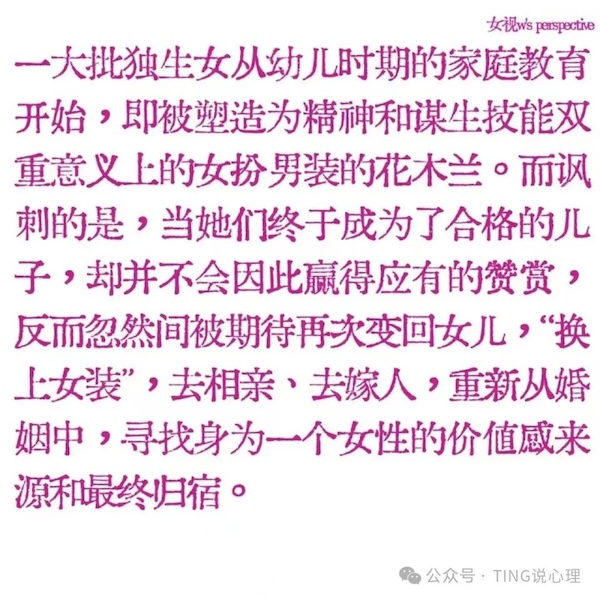
Starting from their earliest childhood education in the home, a large number of female “only children” were molded into Hua Mulans—that is, women who have male qualities, in terms of both spirit and skill at making a living. The irony is that when they finally grow up into “ideal sons,” they do not receive the praise they deserve. Instead, they are suddenly expected to turn back into daughters, to once again “don women’s clothes,” to go on blind dates, get married, and relocate their values and ultimate destinations, within the confines of marriage.
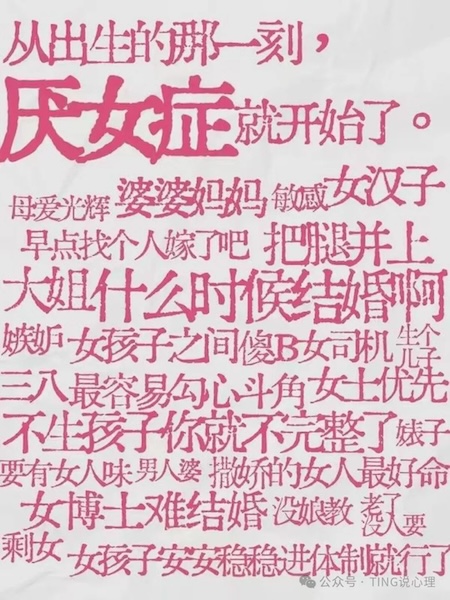
Misogyny begins from the moment of birth—
the glory of maternal love effeminate sensitive tomboy
get married as soon as possible keep your legs together
So when are you getting married?
jealousy between girls stupid female drivers
give birth to a son she’s a “38 type” [derogatory term for women]backstabbing girl-fights ladies first
You’re not complete without kids
slut act feminine badass bitch
spoiled women get spoiled best
No man wants to marry a woman with a PhD
momma didn’t teach you right
when you’re old, no one wants you leftover women
girls are better off with steady, public-sector jobs [Chinese]







